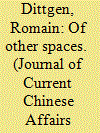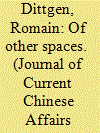| Srl | Item |
| 1 |
ID:
137197


|
|
|
|
|
| Summary/Abstract |
The burgeoning interstate relation between China and Nigeria is in fact hiding the vulnerable condition of transnational Chinese petty entrepreneurship. Small-scale Chinese entrepreneurs in Nigeria are faced with everyday corruption practised by both Nigerian authorities and ordinary Nigerian people, the dominance of self-interest over cohesion and mutual support among the Chinese compatriots, and variations in state policies due to dynamic and changing interstate relations. To overcome their position of weakness, small-scale Chinese entrepreneurs strategize their interactions with both Nigerian and Chinese nationals. Informality is a characteristic of such interactions. Economic informality is primarily embodied in the documentation service businesses that are indebted to those popular corrupt practices in Nigeria; while social informality takes place in cyberspace. Interaction via the Internet among Chinese involved in Chinese–Nigerian businesses helps small-scale Chinese entrepreneurs to cope with fluctuations in interstate links at the macro-level and to develop a sense of community.
|
|
|
|
|
|
|
|
|
|
|
|
|
|
|
|
| 2 |
ID:
137195


|
|
|
|
|
| Summary/Abstract |
Chinese economic activities in Africa have gained increased visibility in parallel to the recent acceleration of Sino-African relations. This paper, which is framed from a geographical perspective that is often absent or neglected in studies covering China–Africa, focuses on the spatial forms and dynamics. It depicts the way in which two contrasting Chinese economic entities – a state-owned company in Chad and privately owned commercial malls in Johannesburg, South Africa – engage with their respective host environments. While drawing on concepts of “liminality” as well as “heterotopias”, I argue that the modalities of the Chinese footprint are characterised both by closure and interaction, creating a dynamic tension that produces its own set of unique practices. This ambivalence between enclave and active linkages with host societies is not only perceivable from a spatial point of view, but also emerges with regard to economic strategies. In the midst of a transitional period, along with a launching and a consolidating phase, the Chinese economic entities in both case studies show signs of change in terms of behaviour and territorial foothold.
|
|
|
|
|
|
|
|
|
|
|
|
|
|
|
|
| 3 |
ID:
137196


|
|
|
|
|
| Summary/Abstract |
Chinese economic activities in Africa have gained increased visibility in parallel to the recent acceleration of Sino-African relations. This paper, which is framed from a geographical perspective that is often absent or neglected in studies covering China–Africa, focuses on the spatial forms and dynamics. It depicts the way in which two contrasting Chinese economic entities – a state-owned company in Chad and privately owned commercial malls in Johannesburg, South Africa – engage with their respective host environments. While drawing on concepts of “liminality” as well as “heterotopias”, I argue that the modalities of the Chinese footprint are characterised both by closure and interaction, creating a dynamic tension that produces its own set of unique practices. This ambivalence between enclave and active linkages with host societies is not only perceivable from a spatial point of view, but also emerges with regard to economic strategies. In the midst of a transitional period, along with a launching and a consolidating phase, the Chinese economic entities in both case studies show signs of change in terms of behaviour and territorial foothold.
|
|
|
|
|
|
|
|
|
|
|
|
|
|
|
|